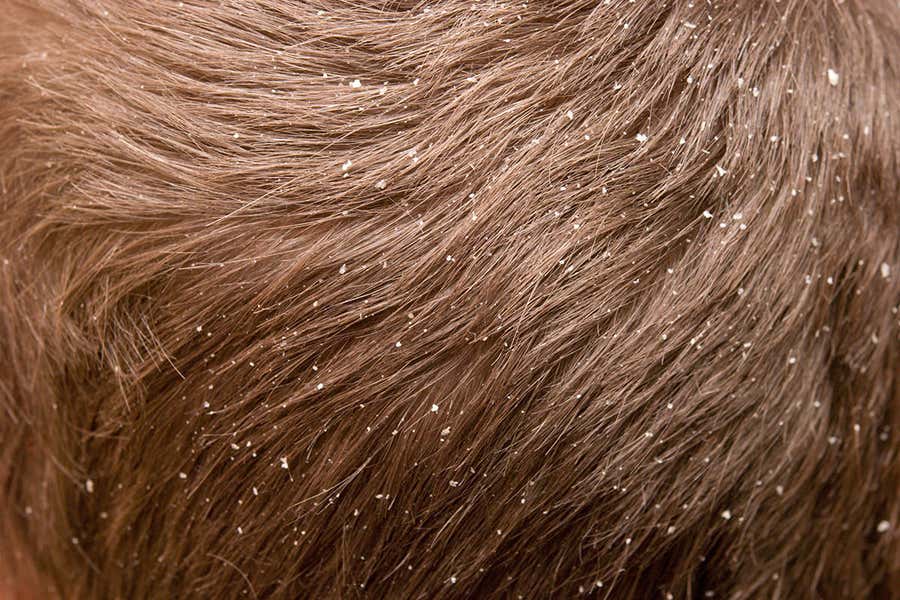Dandruff: Symptoms, Causes, Treatment
What are the symptoms of dandruff?
Dandruff is a common condition that causes the skin on the scalp to flake. The main symptoms of dandruff include:
- White or yellow flakes: These flakes can be noticeable in your hair and on your shoulders, especially if you wear dark-colored clothing.
- Itchy scalp: Dandruff can sometimes cause itching, which may be mild or more severe.
- Dry scalp: The skin on the scalp may appear dry and may feel tight or irritated.
- Oily scalp: In some cases, dandruff can be accompanied by an oily scalp, which can contribute to the formation of flakes.
- Redness: The scalp may appear red or inflamed in some cases, particularly if scratching has occurred.
It’s important to note that dandruff is a common and usually harmless condition, but it can be persistent and may require ongoing management to keep it under control. If you are experiencing persistent or severe dandruff, or if your scalp is very itchy or inflamed, it’s a good idea to see a dermatologist for an accurate diagnosis and appropriate treatment.
What are the causes of dandruff?
Dandruff is believed to be caused by a combination of factors, including:
- Yeast overgrowth: A type of yeast called Malassezia is thought to contribute to the development of dandruff. This yeast is naturally present on the scalp, but in some people, it can multiply excessively, leading to irritation and flaking.
- Oily skin: People with oily skin are more likely to develop dandruff. The excess oil (sebum) on the scalp can provide a favorable environment for the growth of Malassezia yeast.
- Dry skin: Conversely, dry skin can also contribute to dandruff. When the skin on the scalp is dry, it is more likely to flake and shed, leading to the appearance of dandruff.
- Not shampooing enough: Not washing your hair regularly can lead to a buildup of oil and dead skin cells on the scalp, which can contribute to dandruff.
- Certain skin conditions: People with certain skin conditions, such as eczema, psoriasis, or seborrheic dermatitis, are more likely to develop dandruff.
- Sensitivity to hair care products: Some people may be sensitive to certain ingredients in hair care products, such as shampoos or styling products, which can irritate the scalp and lead to dandruff.
- Stress: While the exact mechanism is not fully understood, stress is believed to play a role in the development or exacerbation of dandruff.
It’s important to note that dandruff is a common and usually harmless condition, but it can be persistent and may require ongoing management to keep it under control. If you are experiencing persistent or severe dandruff, it’s a good idea to see a dermatologist for an accurate diagnosis and appropriate treatment.
What is the treatment for dandruff?
Dandruff can often be managed with over-the-counter treatments. Some common treatments for dandruff include:
- Medicated shampoos: Shampoos containing active ingredients such as zinc pyrithione, selenium sulfide, ketoconazole, or coal tar can help reduce dandruff. These shampoos are available over-the-counter or by prescription, depending on the strength of the active ingredient.
- Anti-fungal treatments: Since yeast overgrowth can contribute to dandruff, antifungal shampoos or treatments may be effective. These products often contain ketoconazole or selenium sulfide.
- Tar-based shampoos: Shampoos containing coal tar can help reduce dandruff by slowing down the rate at which skin cells on the scalp die and flake off.
- Salicylic acid: Shampoos or scalp treatments containing salicylic acid can help exfoliate the scalp and remove dead skin cells, reducing flaking.
- Natural remedies: Some people find relief from dandruff using natural remedies such as tea tree oil, aloe vera, or apple cider vinegar. These remedies may help reduce inflammation and itching on the scalp.
- Regular shampooing: Washing your hair regularly with a mild shampoo can help prevent the buildup of oil and dead skin cells on the scalp, which can contribute to dandruff.
If over-the-counter treatments do not effectively manage your dandruff, or if you have severe or persistent dandruff, it’s a good idea to see a dermatologist. They can recommend prescription-strength treatments or other therapies to help manage your dandruff more effectively.




